It’s raining today! Isn’t our Easy Does It rose lovely with the raindrops all over it? It almost looks like an alien life form when the camera is focused this close up.


It’s raining today! Isn’t our Easy Does It rose lovely with the raindrops all over it? It almost looks like an alien life form when the camera is focused this close up.

I’m not trying to make you depressed, but here’s the Gallup presidential approval tracker for Donald Trump and three other recent presidents at about the 100-week mark:
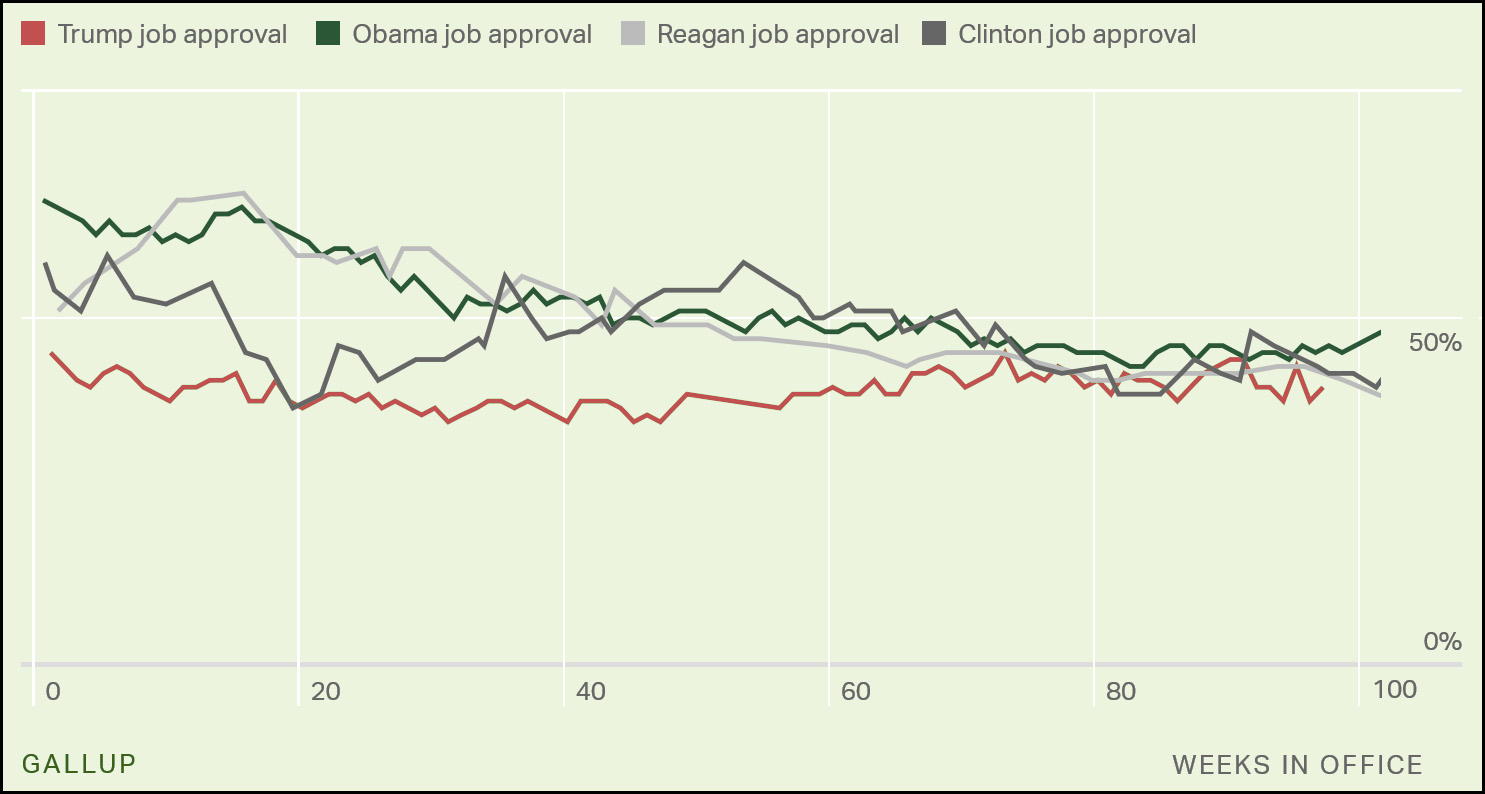
Trump started out with record lows, but his approval level has been flat ever since. The others all declined steadily during their first two years.
So this is where we are. Most presidents show declining popularity as time goes by, usually because their supporters get disillusioned or centrists drift to the other side. Trump, however, has shown surprisingly strong staying power. His fans, both strong and weak ones, continue to support him at about the same level as always. They haven’t become disillusioned or impatient.
With nearly two years of data in hand, I think it’s safe to say that we’re not likely to see Trump’s support plummet. His supporters apparently knew perfectly well what they were getting when they voted for him, and the fact that he keeps delivering it therefore doesn’t bother them.
Of course, something big could happen that would affect his support levels. This happened to Bush with 9/11 and Nixon with Watergate, but a really substantial change is fairly rare. Roughly speaking, Trump is a 40-45 percent president, and all the evidence suggests he’s going to stay there for a while.
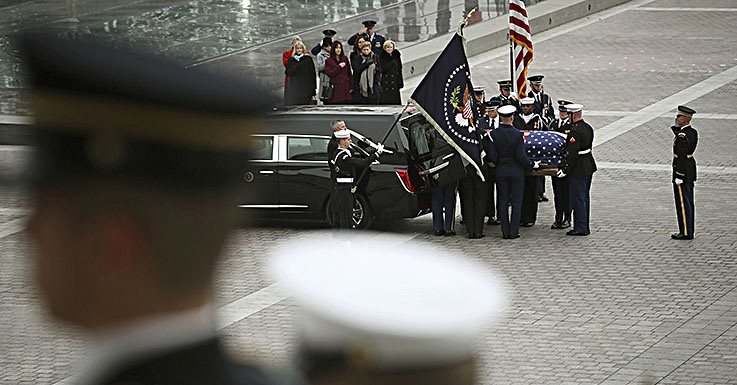
Win Mcnamee/PoolPrensa via ZUMA
It is times like this that make me hate social media more than usual. However, better to light a candle than curse the darkness, right? So here’s how the ordinary world works, folks:
That’s about it. Easy, isn’t it? This is considered common courtesy, and does not mean that (a) nobody is ever allowed to say anything bad about the establishment, or (b) everyone has forgotten what a bad person this was. It just means that out of respect for a grieving family, we lower the howitzers for a few days.
I hope this primer has been helpful for those of you who need it.
Jeff Asher of the New York Times takes a look at 2018 murder rates in big cities and extrapolates a likely decline of about 5 percent nationwide. If that pans out, the US murder rate will look like this:
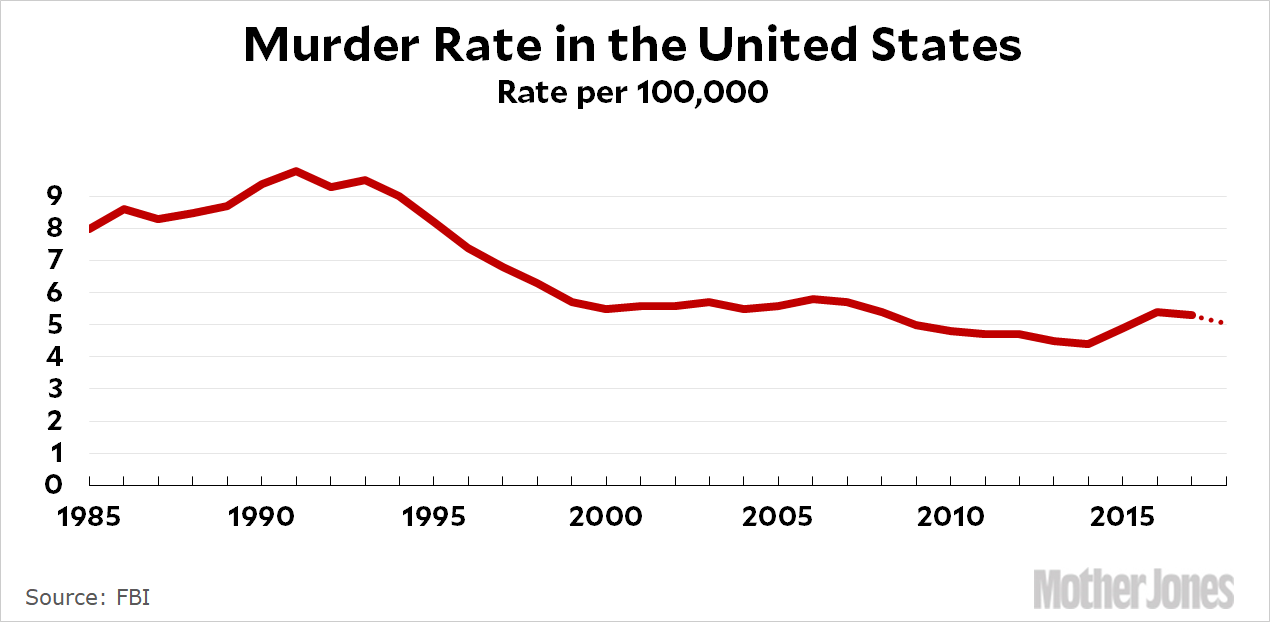
So murder rates rose for two years (2015 and 2016) and have now declined for two years (2017 and 2018). The initial increase was quite large, and still unexplained as far as I know. However, if I had to guess, I’d say it was most likely drug related: murder rates increased as the opioid crisis finally got out of control, and the decline starting last year is a sign that perhaps the opioid crisis has peaked and is now starting to fade. This would be consistent with previous episodes of drug use, which have always been episodic and faddish, with a lifetime of around ten years or so (heroin —> crack —> marijuana —> meth —> opioids).
My prediction: murder rates will continue to decrease as the opioid epidemic finally burns out and will then plateau at around 4.0. Stay tuned.
Studying in the park.

I don’t know for sure if the rural/working class revolt in France is more about fuel taxes, reduced speed limits, or just a general dislike for that city slicker Emmanuel Macron. But higher diesel prices are part of it, so yesterday Macron backed off his new fuel taxes, which were explicitly imposed as a way of reducing fuel use in response to climate change. This all happened in a country that’s pretty progressive on environmental issues.
Meanwhile, Canada is one of the greenest countries you could imagine. But does that mean they’re going to stop drilling for oil in their famous tar sands? Oh my no. Just the opposite. Likewise, Jerry Brown is America’s greenest governor, but that doesn’t mean he’s willing to put limits on oil drilling in California.
Hypocritical? Sure. But keep in mind that this is about as good as it gets. In the less developed countries, they’re barely even willing to adopt a veneer of caring about climate change if it requires any sacrifice at all. China is still all-in on coal and India has little interest in doing anything that might hurt economic growth by a tenth of a percentage point.
And the United States—well, I hardly have to say anything about the United States, do I? We’re the richest big country in the world, and we probably have the strongest capacity of any nation on earth to generate huge amounts of solar and wind power with only modest sacrifice. But we don’t. We had a green president for a few years, but Republicans in Congress refused to consider even a limited plan to raise the cost of dirty energy. Today we have a president who actively prefers coal mining and oil drilling to clean energy because his base works in those industries.
I could go on. But what’s my point? Just this: the danger of future climate change is now about as clear as it’s going to get. It’s not a matter of computer models anymore. Just look around you and the evidence is all there: wildfires, droughts, hurricanes, desperate migrants, the Northwest Passage opening up. Those will get slowly worse over the next few decades, but they’re already bad enough to be clearly visible. And yet there’s still no real willingness to reduce fossil fuel use anywhere. Not if it costs more than a trivial few cents anyway, and even at that it’s hard to get the public to approve it unless that cost is buried somewhere.
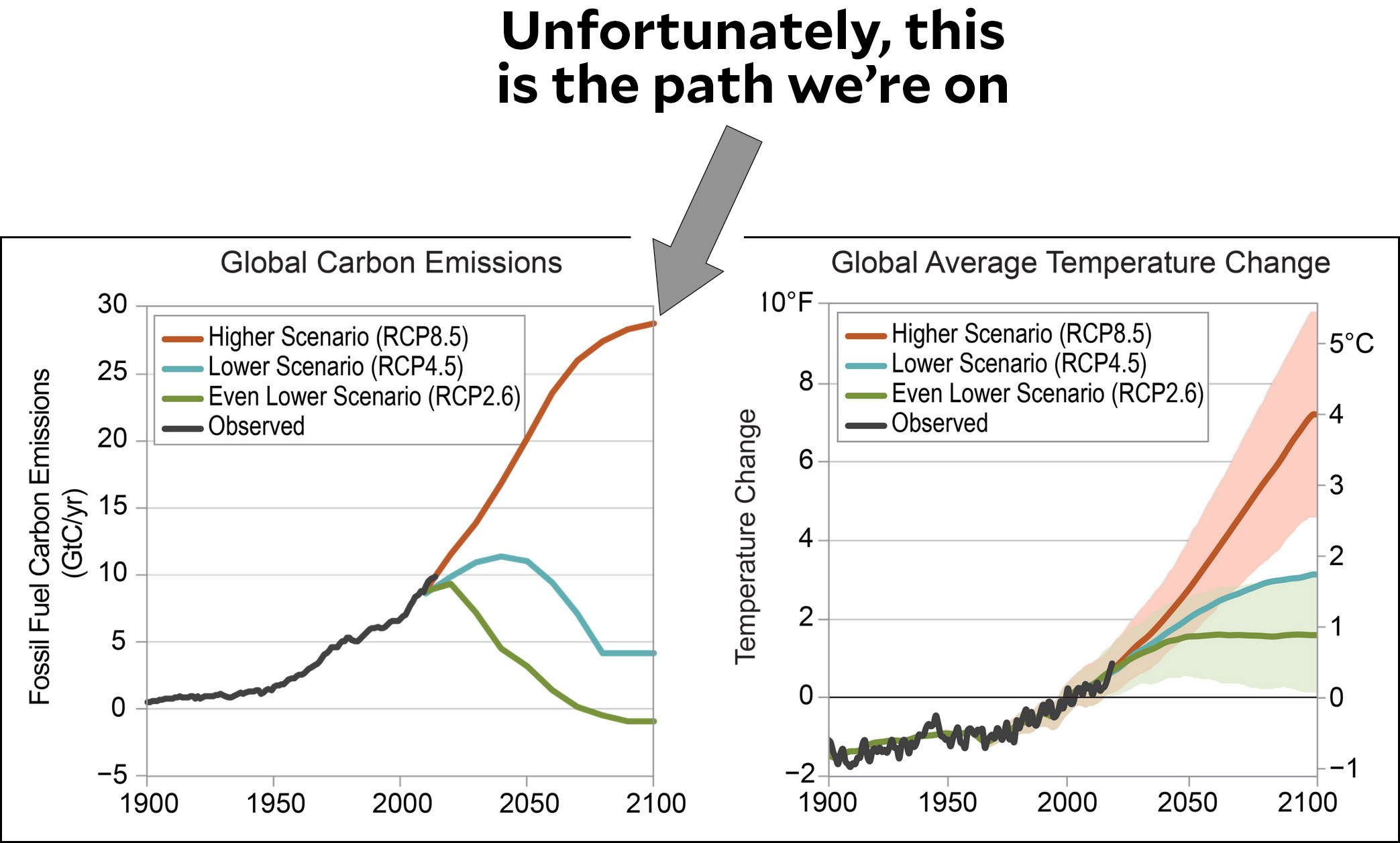
Like most of you I want to keep fighting to reduce fossil fuel use, but at the same time I’ve come to recognize the reality that it’s not going to happen. Not via carbon taxes or lots of hectoring, anyway. As Chris Hayes has pointed out, there’s about $20 trillion worth of fossil fuels still left in the ground right now. Knowing what you know about human nature, what are the odds that anyone is going to leave all that money there? About zero, right? Hayes compares it to the $10 trillion economic value of slaves in the South on the eve of the Civil War, and points out that this is why the South would never, ever voluntarily give up chattel slavery. It took four years of the bloodiest war in history to finally force their hand.
I would say the same is true today: the owners of fossil fuels will never, ever voluntarily give up their reserves. Something on the order of World War II might force them to do it, but who would be fighting whom? There are no opposing sides in this war.
Bottom line: there is no feasible way to keep all that carbon in the ground merely through regulation or fuel taxes or whatnot. It might help a bit, which means we should keep trying, but in the end it won’t work except on the margins. I don’t like this conclusion any better than anyone else, but I think it’s correct.
So what’s the answer, aside from frying the planet? That’s simple: we need a miracle. And we should be spending vast sums of money to get one.
The “miracle,” in this case, is anything that either (a) produces cheap, clean energy in abundant quantities, or (b) safely removes carbon from the atmosphere at scale. That’s it. The former would keep fossil fuels in the ground by reducing its economic value, while the latter would halt global warming even if we burn every last gram of coal and oil on the planet.
That’s what we should be spending our money and emotional energy on—and not in our current nickel-and-dime way. I’d say we need a Manhattan Project-like commitment and annual spending of around 1 percent of GDP. And that’s global GDP I’m thinking of. Call it $500 billion in round numbers. The US share would be around $200 billion or so. Every. Single. Year.
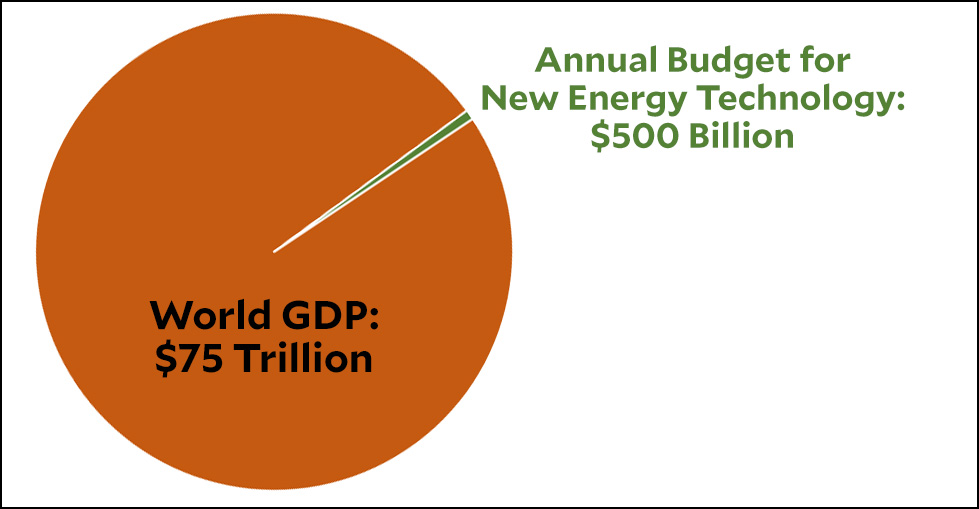
We’ve already made significant progress on wind and solar, and there are other renewable energy sources out there too. But they aren’t enough. There are theoretical limits to how much solar power we can harness and practical limits to how much wind power we can capture. What we need is some kind of massive breakthrough that we can barely imagine yet. I have no idea what it might be, but I’m willing to bet it’s out there.
And there’s actually a chance of this working. The public hates higher taxes and stricter regulations, but they love spending money. If world leaders got together and declared this a war, everyone would cheer. And both national leaders and their publics would adore the idea of hundreds or thousands of huge research projects springing up all over the world to invent valuable new technologies.
It might even work. That’s the best I can honestly say about it. But even at that, it’s still a lot better odds than trying to keep all those fossil fuels in the ground.

I have now read about a dozen articles taking Tumblr to task for its decision to ban adult content. I don’t get this. Tumblr’s decision was very clearly forced on it by Apple, which removed Tumblr from the App Store until it cleaned up its act. This is the equivalent of the death penalty: Tumblr can’t survive without access to the Apple ecosystem, so they have to do what Apple tells them.
So why isn’t everyone yelling at Apple instead? They’re the ones who are responsible for this new policy. But … crickets.
POSTSCRIPT: If I were running Tumblr, I’d fork the app and create a new one just for Apple. If you want the old Tumblr, you can get it on Android or Windows or whatever. If you insist on using an iPhone, you get a bowdlerized version. Don’t like it? Complain to Tim Cook.
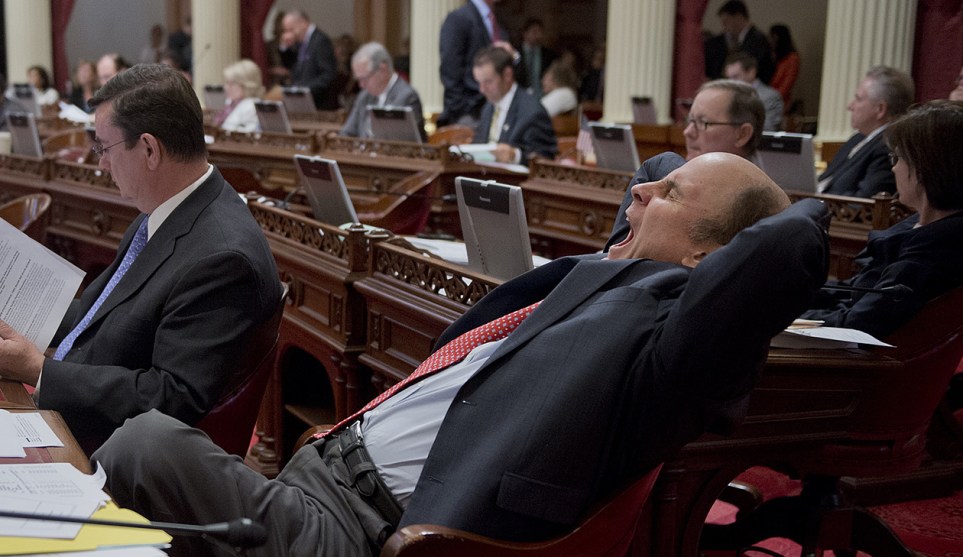
Renee C. Byer/Sacramento Bee/ZUMAPRESS
I’ve been hospitalized once in my life, four years ago, and ever since then a very specific question has rattled around my brain, fruitlessly seeking an answer: Why are hospitals designed to allow patients as little sleep as possible?
Is my phrasing a little too aggressive? Designed to prevent sleep? Maybe that’s going a tiny bit too far. Instead let’s say: Why do the people who design hospitals not give a rat’s ass about patients getting any sleep?
There. That’s better. And it’s nuts. The whole point of hospitals is to care for sick people, and getting adequate sleep is a critical part of recovery. So why would every part of every hospital be designed without the slightest consideration of sleep? I’ll hand the mic over to Austin Frakt for a bit:
Peter Ubel understands the problem as both a physician and patient. When he spent a night in the hospital recovering from surgery in 2013, he was interrupted multiple times by blood draws, vital sign checks, other lab tests, as well as by the beeping of machines. “Not an hour went by without some kind of disruption,” said Dr. Ubel, a physician with Duke University. “It’s a terrible way to start recovery.”
….Solutions aren’t hard to fathom. Dr. Ubel listed some in 2013. Hospital workers could coordinate so that one disruption serves multiple needs: a blood draw and a vitals check at the same time instead of two hours apart. Or they could allow patients’ needs to guide schedules. If a patient is at low risk and can go six or eight hours without a vitals check, for example, perhaps don’t do that check once every four hours.
Small changes in hospital routines like these can go a long way. A clinical trial to test them found that they significantly reduced the proportion of patients reporting hospital-related sleep disruptions, and they cut sedative use in half. These small changes can even increase patients’ ratings of hospitals, which are now part of Medicare quality measures. The key insight seems to be to prioritize patients over tests and other interruptions that can be deferred.
As Frakt says, solutions aren’t hard to fathom. In fact, they’re trivially easy to figure out. This is why hospital routines strike me as deliberate negligence: they could only be put in place by administrators who literally don’t care about anything except the convenience of doctors.
Is there anything we poor patients can do? It’s hard to say. One time I asked a nurse to turn off the sound on the IV drip, and he actually did try to do it. But apparently he didn’t know how, because it kept beeping all night regardless of whether there was a problem. This does not give me great confidence in the possibility of further noise-reduction measures.
FWIW, though, it is sometimes possible to get better treatment. After a couple of days during my stay, I made a sort of handshake deal with my nurses to leave me alone between 11 and 7. This mostly worked (and was reasonable in my case since I was only there waiting for the first round of chemo to start). I also refused to allow the night nurse to draw blood at 4 am, and that was that. She never came back, and that was fine: after all, there are lots of cases where they really don’t need your counts on a daily basis. And they certainly don’t need them at 4 am. That’s merely for the convenience of doctors, who want the results back by 8 am.
There’s much more that could be done about this, but I’ll spare you. This is my rant for the day—now backed up by an official column in the New York Times. I can’t wait for the letters to pour in offering BS excuses for why none of these solutions is really possible.
After I took yesterday’s sunset picture over Big Bear Lake, I picked up my tripod, turned around to return to my car, and…
…saw this picture. It’s part 2 of my quasi-diptych: Sunset and Moonrise at Big Bear. Enjoy.
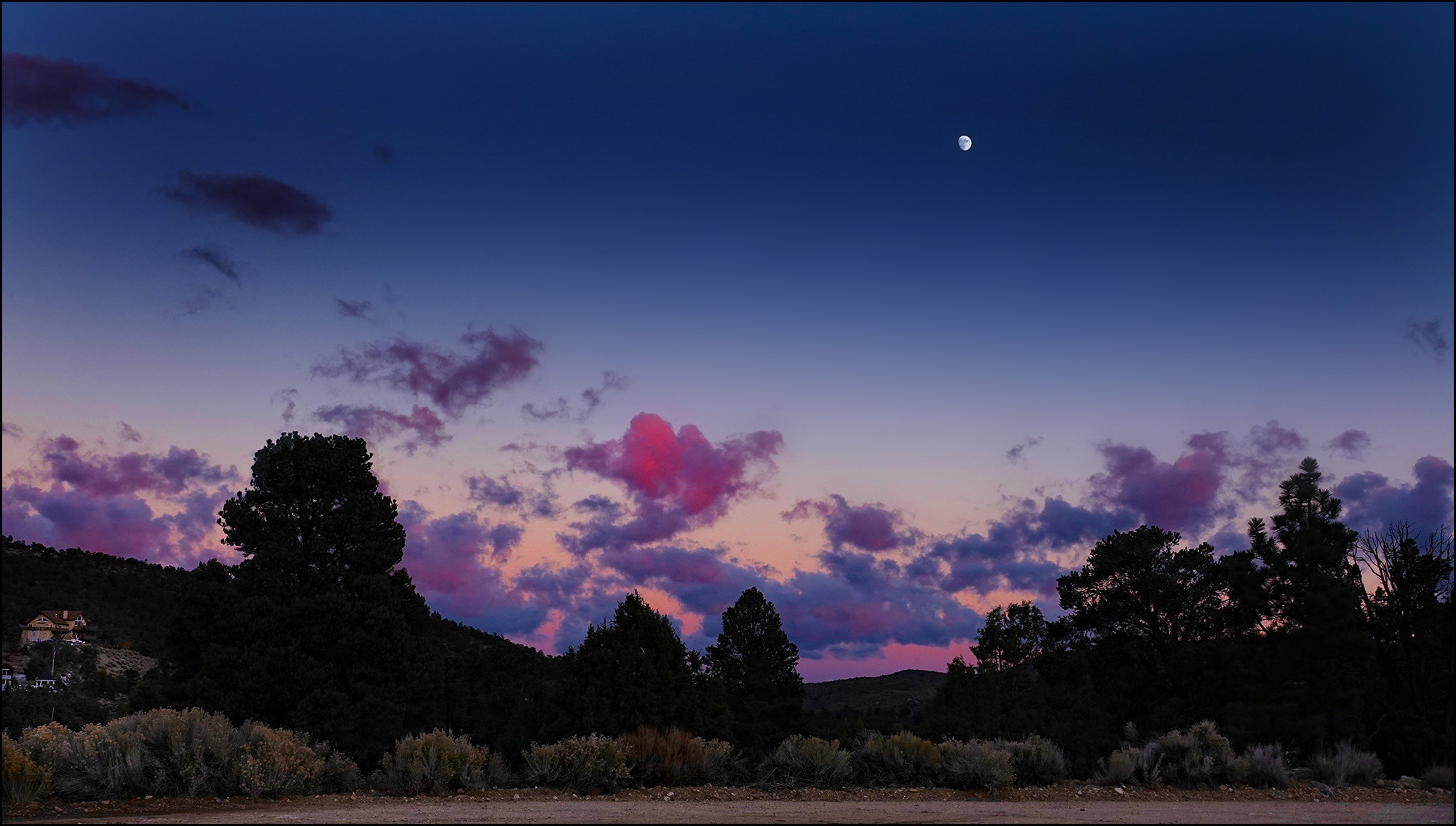
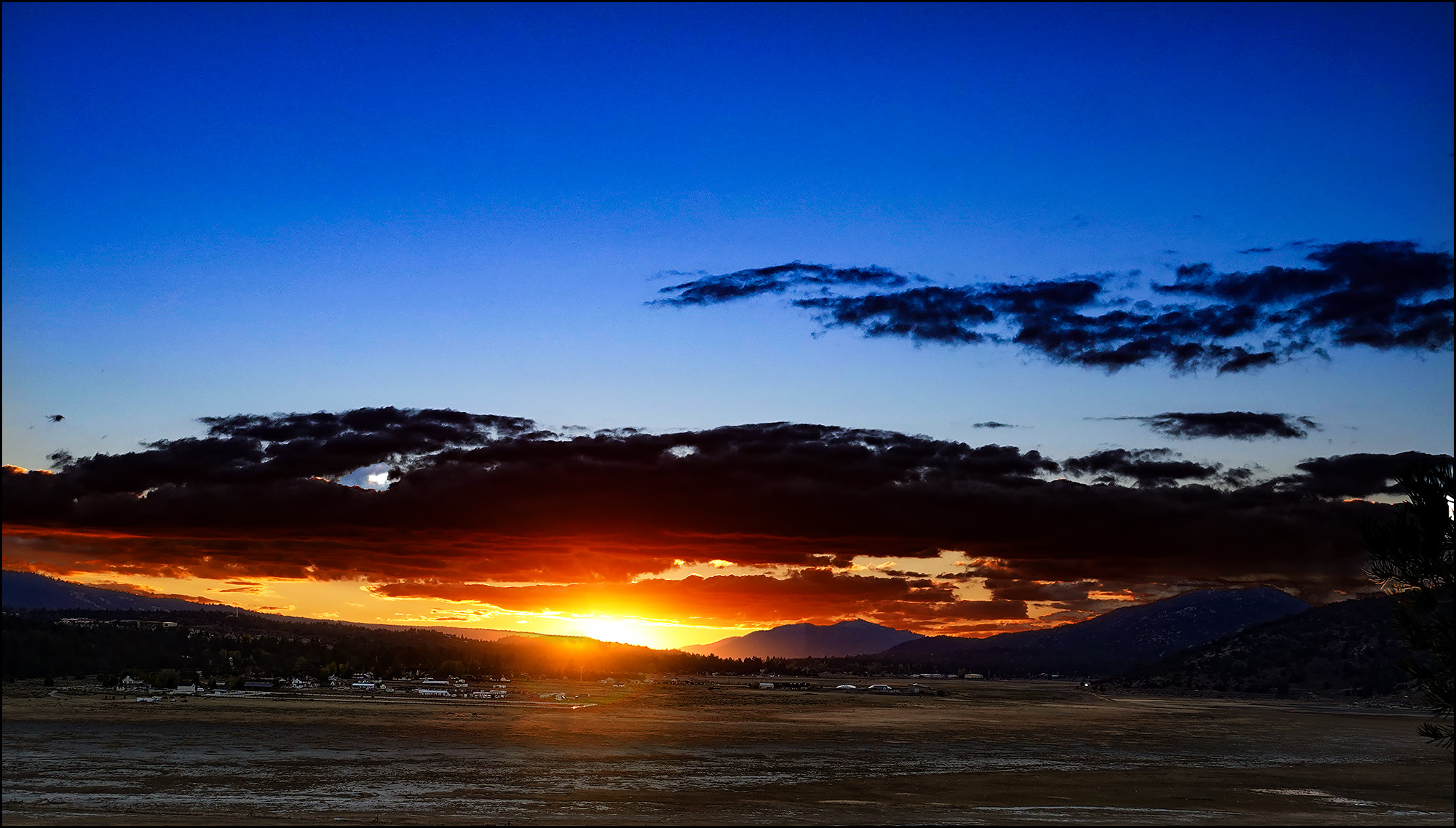
Yesterday the stock market surged, supposedly on news that a trade deal with China was in the works. Today, the stock market has plummeted, supposedly on news that Trump lied about how likely a deal really is. If all this is actually true, it means that Wall Street investors are idiots. They can’t possibly still be taking Trump’s tweets at face value, can they?
There’s no telling, really. In any case, explanations of why the market has gone up or down on any particular day should always be taken with a shaker of salt. The more likely explanation is shown in this chart:

The market has been volatile ever since October. If I knew why I’d be a billionaire, and for all you know, maybe I am. But I’m not. So I have no idea why everyone has gotten so jittery over the past couple of months. Whatever the reason, though, this week’s ups and downs are most likely just the same jitters that began in October. I doubt they really have anything to do with Trump’s Twitter idiocies at all.
Speaking of which, did you hear that Trump signed the new and improved NAFTA treaty while he was in Argentina? Unfortunately, our dealmaker-in-chief, who’s signed so many deals you wouldn’t believe it, couldn’t figure out where to sign this one.